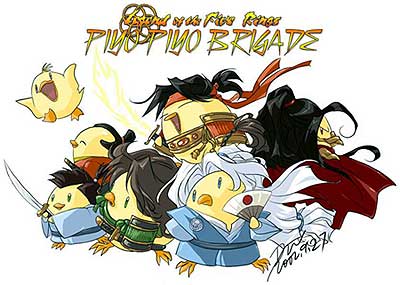|
Japanese titles making you fret? Giving you trouble? I must apologize profusely, but in some cases the names and titles are important, and would sound pretty silly when translated into English, Jikken being a good example.
Jikken
Jikken is the term used to refer to the ten signs for the calendar. They are composed of the five elements (fire, water, earth, air, and metal) and comes in pairs of older and younger 'siblings'.
Other terms used in Jikken:
Shiki no Uta has two readings, depending on the kanji of Shiki. One is 'The last song' and the other is 'Song of the four seasons'. For an amazing song that is entitled "Shiki no Uta", that is available in the Samurai Champloo OST Departure.
Go terms
Fuseki, Chuuban, and Shukyoku refers to the different stages of a Go game.
Fuseki are the opening moves of the players as they sketch out the territories and the whole board is taken in consideration in preparation for the beginning of battle.
Chuuban is the point in which invasion and attacks take place. Territories are exchanged and the earlier shapes are given solidity in the form of 'walls'.
Shukyoku is also known as Yose. This is the endgame in which the final shapes are formed.
Other Go terms:
Furikawari which was written as Exchange, is when you lost territory in a battle but gained territory somewhere else. It can also refer to a situation where the two players enter unclaimed territory to divide it, or even when a player is eliminating his opponent's stone around one of his stones containing aji, or potential. I used this for this short excerpt because I believed Ryuudo was going to break away from Migetsu to see how well he had developed without the burden of their relationship blocking the full potential of the adoptive Doji.
Tenuki which was written as a shift in focus, means a move in which you ignored your opponent's last move, playing somewhere else. This shifts the focus of local engagement from one side of the board to the other, which means you will have an advantage because you will be the attacker on that side of the board, instead of being the defender as in the former area of local engagement. In this very broad sense, it can refer to the way Ryuudo gave up on Migetsu, just so he can focus on his court duties, thereby reinforcing the idea that Ryuudo can live without Migetsu, and damaging Migetsu's pride. But also it could refer to the way Migetsu decided to throw all his energy to mastering the one thing that would show his growth to his beloved Ryuudo. ^_^
Sabaki or Development, is a difficult term to translate. When it comes to Go it often refers to 'shapes' formed while creating large territorial frameworks, in which you create 'eyes' or areas that cannot be attacked by your opponent. Sabaki is essential when it comes to the middle game, in which you are finally battling it out for territory. Sabaki is also the idea of having a shape with great flexibility and resilience, where you can use a variety of tactics (including sacrifice tactics) to save your territory. Kitani-sensei wanted to see how his two students have grown and how well they can handle each other now that they know themselves better.
Other titles
Akai kanashimi lit. 'Red sorrows'. This comes from the ending theme of Gasaraki, entitled 'Love song.' The lines were kowashite watashi no kokoro o / akai kanashimi ga / afurete nagarete kuru kara which translates to 'Break my heart / Because a red sorrow / is spilling out from it.' Sad, nee? The ending video in which the two main characters fought upon a hillside became the inspiration for the final duel (except Hisui used a sword instead of a bow and arrow, but...), hence the rather sudden change in pace in the writing. I've re-written it, hoping to make it flow better. When Hisui tried to get a pillow book by this title, she casually mentioned 'Akai sabishii' as well. Akai sabishii roughly translates to red loneliness, though I'm pretty sure it's wrong, since sabishii is an adjective as far as I know.
Onigiri are those really fun riceballs you can make.
Omake are extras.
Shichi-go-san, lit. 'seven-five-three' refers to a festival of children of ages - you guessed it - seven, five, and three years old. I should reword it as 'san-go-shichi' because that's the correct order of age that Torajirou was, but it doesn't sound as good as Shichi-go-san, right? Maybe 'san-go-nana'?
Piyo-piyo are cute yellow chicks from Tung Ling Co Design (I thought they were from Sanrio - I was wrong!). No one can actually recall how the heck piyo-piyo versions of L5r characters came to be, but they're very cute! The L5r piyo-piyo brigade sort of look like this:

Art by Dorothy Winner. We miss you, Hoshi-sama!
|
